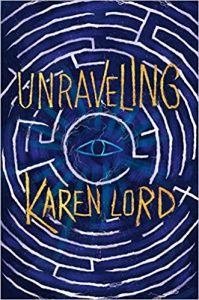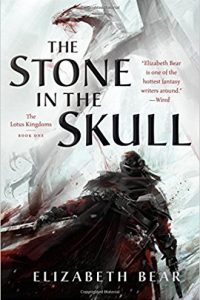Gary K. Wolfe Reviews Unraveling by Karen Lord
 Unraveling, Karen Lord (DAW 978-0-7544-1520-4, $26.00, 258pp, hc) June 2019.
Unraveling, Karen Lord (DAW 978-0-7544-1520-4, $26.00, 258pp, hc) June 2019.
I don’t think it’s giving anything away to note that the final section of Karen Lord’s Unraveling is titled “Metanoia”, since that term has at least a couple of meanings that are relevant not only to the new novel (her fourth), but to the whole body of her work to date. The more-or-less theological meaning, which has to do with repentance or redemption, harks back to the main themes of her award-winning Redemption in Indigo, not to mention important subthemes in what might be called her diaspora space operas The Best of All Possible Worlds and The Galaxy Game. The more clinical use of the term in psychology involves some sort of transformation following a breakdown, and that is pretty much exactly what happens with Unraveling‘s main character, forensic therapist Dr. Miranda Ecouvo. There are spiritual as well as psychological transformations at work in the novel, in which Lord returns from the galaxy-spanning SF of her last two novels to the world of archetypes and folklore that informed Redemption in Indigo. It’s a completely independent novel, though readers of that earlier work will recognize the village of Makhenda and the figure of Paama, whose son Yao – also known as Chance – emerges as another major character facing the consequences of transformation; he’s partly human, and partly one of the supernatural figures called the undying. His brother, known only as the Trickster, is the third central character.
Miranda works for a labyrinthine coastal municipality known only as The City, about which we learn very little, except that members of its privileged class are called Freemen. As the novel opens, she has aided in the capture of a notorious serial killer named Walther Grey, but soon learns that there may be a good deal more to the case than she suspects. Walking home from work, she sees her exact double step into the path of a speeding omnibus – a terrific opening hook – then finds herself in a literally labyrinthine shadow world, transported there by Chance, who has taken an interest in her investigation for reasons that go beyond those of a simple serial killer. While there, she must negotiate a series of labyrinths that gradually reveal why the mystery is of particular interest to the supernatural world: someone other than Walther Grey is behind the brutal murders. While the identity and motive of the true villain isn’t particularly shocking by the terms of supernatural mystery stories, the means by which they get there is fascinating: Chance and the Trickster can follow memory threads to any particular place and time, so that they can interact with the various victims, who emerge as characters in their own right, and not just a body count.
Lord sets herself some tricky challenges at the outset, which may impede some readers in getting into the swing of the narrative. She has to orient us to two contrasting and unfamiliar settings – the City and the shadow realm of the spirits – while laying out the terms of what in many ways is a police procedural plot, and revealing the tensions between Chance and Trickster and their allies and enemies – especially a powerful figure called Patience – as well as between Miranda and her colleagues. These are quite a few threads to follow, but as their various connections become apparent, and certain relationships emerge as central (such as that of Miranda and Chance), the story develops an increasing urgency, both in its more cosmic themes and in the personal challenges of its main characters. Drawing on mystery, fantasy, myth, and family drama, Unraveling finally pays off in satisfying, surprisingly humane, and moving ways.
Gary K. Wolfe is Emeritus Professor of Humanities at Roosevelt University and a reviewer for Locus magazine since 1991. His reviews have been collected in Soundings (BSFA Award 2006; Hugo nominee), Bearings (Hugo nominee 2011), and Sightings (2011), and his Evaporating Genres: Essays on Fantastic Literature (Wesleyan) received the Locus Award in 2012. Earlier books include The Known and the Unknown: The Iconography of Science Fiction (Eaton Award, 1981), Harlan Ellison: The Edge of Forever (with Ellen Weil, 2002), and David Lindsay (1982). For the Library of America, he edited American Science Fiction: Nine Classic Novels of the 1950s in 2012, with a similar set for the 1960s forthcoming. He has received the Pilgrim Award from the Science Fiction Research Association, the Distinguished Scholarship Award from the International Association for the Fantastic in the Arts, and a Special World Fantasy Award for criticism. His 24-lecture series How Great Science Fiction Works appeared from The Great Courses in 2016. He has received six Hugo nominations, two for his reviews collections and four for The Coode Street Podcast, which he has co-hosted with Jonathan Strahan for more than 300 episodes. He lives in Chicago.
This review and more like it in the June 2019 issue of Locus.
 While you are here, please take a moment to support Locus with a one-time or recurring donation. We rely on reader donations to keep the magazine and site going, and would like to keep the site paywall free, but WE NEED YOUR FINANCIAL SUPPORT to continue quality coverage of the science fiction and fantasy field.
While you are here, please take a moment to support Locus with a one-time or recurring donation. We rely on reader donations to keep the magazine and site going, and would like to keep the site paywall free, but WE NEED YOUR FINANCIAL SUPPORT to continue quality coverage of the science fiction and fantasy field.







I jumped on reading this review to get a different perspective. I’m still not seeing it. Here is my good reads review.
————
I simply cannot recommend this book at all. It was totally opaque. There were sequences from one paragraph to another where the jump made no sense to me. I kept at it for two reasons. First, my book club was reading it, and I like the social aspect. Second, I felt there must be a literary aspect that I was just not getting and I wanted to meet the challenge. In the end there was failure – it’s up to other readers to decide who is culpable.
If you do read this book note that there is apparently an earlier novella with some of the main characters. I cannot imagine what context that could provide to untangle the knots that *I* ran into in this book. But I doubt reading that first would hurt.